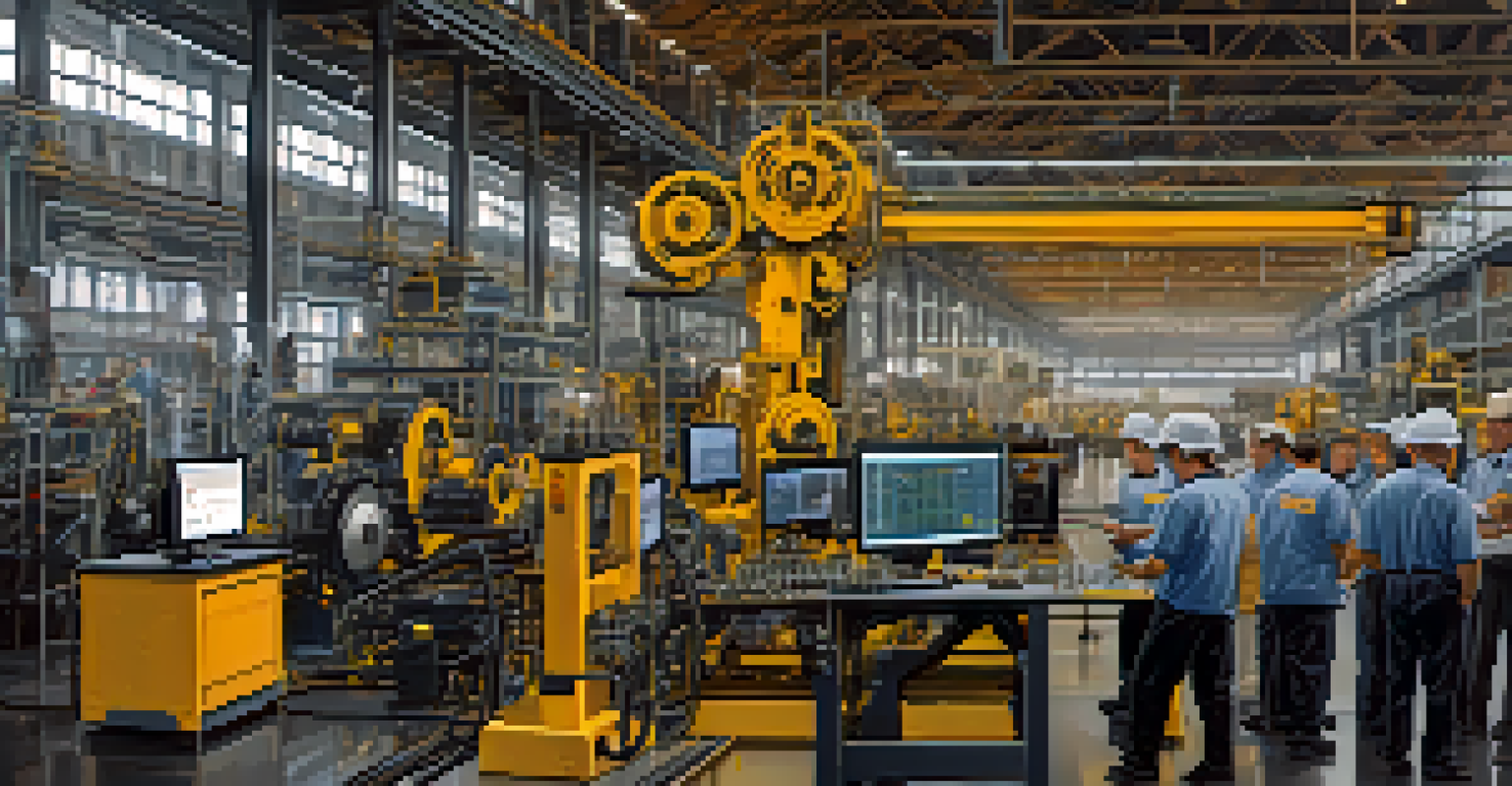The Role of IoT in Modern Business Operations

Understanding IoT and Its Importance in Business
The Internet of Things (IoT) refers to the interconnected network of devices that communicate and exchange data. In modern business, this technology plays a crucial role in enhancing efficiency and decision-making processes. By integrating IoT, companies can gather real-time data, leading to better insights and faster responses to market changes.
The Internet of Things is not a trend; it is a tool for transforming the way we live and work.
For instance, a manufacturing unit can utilize IoT sensors to monitor machinery performance and predict maintenance needs. This proactive approach not only minimizes downtime but also extends the lifecycle of equipment, ultimately saving costs. As businesses increasingly rely on data-driven strategies, understanding IoT becomes vital for maintaining a competitive edge.
In essence, IoT is not just a technological trend; it’s a transformative force that empowers businesses to optimize operations and improve customer experiences. As we delve deeper, we’ll explore specific ways in which IoT is reshaping various sectors.
Enhancing Operational Efficiency with IoT Solutions
One of the most significant benefits of IoT in business is its ability to streamline operations. With connected devices, companies can automate routine tasks, reducing the need for manual intervention and enhancing productivity. For example, smart inventory management systems can track stock levels in real-time, ensuring that businesses never run out of essential supplies.

Additionally, IoT can facilitate better resource allocation. By monitoring energy usage through IoT-enabled smart meters, businesses can identify inefficiencies and implement energy-saving measures. This not only lowers operational costs but also contributes to sustainability efforts, appealing to environmentally conscious consumers.
IoT Enhances Business Efficiency
Integrating IoT technologies streamlines operations, automating routine tasks and improving productivity.
Ultimately, the integration of IoT into daily operations allows businesses to operate more smoothly and respond swiftly to challenges, setting the stage for long-term growth and success.
Data-Driven Decision Making with IoT Analytics
IoT technology generates vast amounts of data, which can be harnessed to inform crucial business decisions. By analyzing this data, companies can identify trends, customer preferences, and operational bottlenecks. This analytical capability empowers businesses to make informed, data-driven decisions rather than relying on gut feelings or outdated methods.
In the age of IoT, businesses must embrace data analytics to drive decisions and enhance customer experiences.
For example, retailers can use IoT data to understand shopping patterns and optimize store layouts accordingly. By knowing which products are frequently purchased together, they can strategically place those items near each other, boosting sales. Such insights transform the way businesses approach strategy and marketing.
Moreover, the ability to continuously analyze data means that businesses can adapt to changes in real-time, enhancing their agility and responsiveness in an ever-evolving market landscape.
Improving Customer Experience Through IoT Innovations
In today’s competitive marketplace, customer experience is paramount, and IoT can significantly enhance this aspect. Businesses can use connected devices to provide personalized experiences and ensure customer satisfaction. For instance, smart home devices can learn user preferences and automate settings accordingly, creating a seamless living environment.
Moreover, by utilizing IoT technology, companies can offer proactive customer service. If a smart appliance detects a potential issue, it can alert the customer and even schedule a service appointment automatically. This level of service not only delights customers but also builds trust and loyalty towards the brand.
Data-Driven Insights from IoT
IoT generates valuable data that enables businesses to make informed decisions and adapt to market changes.
Ultimately, IoT-driven innovations help businesses create engaging, personalized experiences that resonate with customers, leading to increased retention and lifetime value.
Real-Time Monitoring and Predictive Maintenance Benefits
Real-time monitoring is one of the most powerful applications of IoT technology, especially in industries like manufacturing and logistics. With IoT sensors, businesses can monitor equipment performance and detect anomalies as they occur. This capability allows companies to address issues before they escalate into costly breakdowns.
Predictive maintenance, driven by IoT data, enables businesses to schedule repairs based on actual usage and wear-and-tear patterns. For example, a fleet management company can monitor vehicle health in real-time, predicting when maintenance is necessary and avoiding unexpected failures. This proactive approach to maintenance translates to significant cost savings and enhanced operational reliability.
The combination of real-time monitoring and predictive maintenance exemplifies how IoT can transform asset management, increasing efficiency while minimizing disruptions in the workflow.
Supply Chain Optimization with IoT Technologies
IoT plays a pivotal role in optimizing supply chain operations, from tracking shipments to managing inventory levels. By using IoT devices, businesses can monitor the location and condition of products throughout the supply chain. This visibility allows for better planning and reduced delays, ensuring that goods reach customers on time.
Moreover, IoT can help in managing inventory more effectively. Smart shelves equipped with sensors can automatically notify businesses when stock is low, facilitating timely reordering. This level of automation minimizes the risk of overstocking or stockouts, leading to improved cash flow and customer satisfaction.
Improving Customer Experiences
IoT innovations allow businesses to provide personalized service and proactive customer support, enhancing satisfaction and loyalty.
In short, IoT technologies empower businesses to create a more agile and responsive supply chain, adapting quickly to market demands and enhancing overall efficiency.
Security Challenges and Solutions in IoT Implementation
While the benefits of IoT are vast, implementing this technology also comes with its share of security challenges. With so many devices connected to the internet, businesses must be vigilant about protecting sensitive data and maintaining privacy. Cybersecurity threats can jeopardize not only a company’s operations but also its reputation.
To mitigate these risks, businesses need to adopt robust security measures. This includes implementing encryption protocols, regular software updates, and employee training on best practices for data protection. For example, using strong passwords and multi-factor authentication can significantly enhance security across IoT devices.

By proactively addressing security concerns, businesses can confidently embrace IoT technologies while safeguarding their operations and customer trust.
The Future of IoT in Business: Trends to Watch
As technology continues to evolve, the future of IoT in business looks promising. Emerging trends, such as the integration of Artificial Intelligence (AI) with IoT, are set to enhance data analysis capabilities even further. This combination enables businesses to not only collect data but also derive actionable insights that drive innovation.
Additionally, the expansion of 5G technology will enhance IoT connectivity, allowing for faster data transmission and more devices to be connected simultaneously. This advancement will unlock new possibilities, such as real-time remote monitoring and control over various operations.
Ultimately, as IoT technology continues to advance, businesses that adapt and leverage these innovations will be well-positioned to thrive in an increasingly connected world.